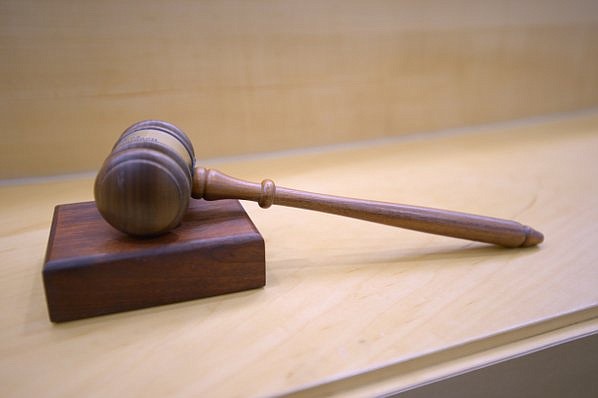A Little Rock man arrested in July 2018 and charged by a federal grand jury with sex trafficking of a minor was in court Tuesday for what is expected to be a three- to four-day jury trial.
Anthony Atkins, 25, faces allegations that he exploited a 17-year-old girl by prostituting her online, including posting an advertisement for an "Exotic white girl" with a cellphone number that was reported to the FBI by Little Rock's Child Exploitation Task Force in June 2018. Atkins was arrested after detectives messaged the cellphone and arranged a meeting at which they arrested the girl, who in turn led them to Atkins.
After five hours of voir dire Tuesday afternoon consisting of a long list of questions from U.S. District Judge Lee P. Rudofsky and a few brief questions by attorneys for both sides, a jury was selected.
Shortly before Rudofsky entered, assistant U.S. attorneys Benecia Moore and Kristin Bryant walked in flanked by an FBI agent and an IT specialist, grabbed chairs from the prosecutor's table and moved them to the other side so that all four would be facing the jury box.
Defense attorneys Latrece Gray and Tamera Deaver, both with the federal public defenders office in Little Rock, had already entered, joined by Atkins, who was escorted in by federal marshals. All sat facing the jury box from the defendant's table.
Just after 1 p.m., the door next to the jury box opened and the jury pool -- 53 people selected at random from around the district, -- slowly filed in. Fourteen took seats inside or in front of the jury box and the remainder filled the seats in the courtroom gallery. Each one wore an adhesive tag with the word "Juror" followed by a number.
Rudofsky spent about three hours in three sessions lasting just over one hour each questioning the prospective jurors on a wide range of topics from their personal feelings about law enforcement, technology and social media, to who had served on a jury, been a victim of a crime, worked for the government, been a victim or knew someone who was a victim of sexual assault, ever been convicted or knew anyone who had been convicted of a crime.
Prospective jurors were also questioned on their familiarity with cityxguide, an online adult personals website, as well as more mainstream social media platforms.
"Is anybody familiar with Snapchat, Kik, Facebook, Instagram, or Pinger?" Rudofsky asked, at which everyone in the jury pool raised their hands as laughter swept the courtroom.
"I figured we were going to get that," the judge said, then decided to take each platform one at a time but with a different tack.
"We're going to try to short circuit this one a little bit," he said. "Who is not familiar with Snapchat?"
Sixteen people raised their hands.
"Who is not familiar with Kik?" he asked, and 37 hands were raised in response.
"Is there anyone not familiar with Facebook?" Rudofsky asked, at which no hands were raised and a swell of laughter once again rolled through the courtroom.
"Mark Zuckerberg would be proud," Rudofsky deadpanned.
Prospective jurors who were uncomfortable answering a particular question in open court were allowed to come to the bench. At each juncture, the prospective juror would approach the bench, trailed by Bryant, Moore, Gray and Deaver, then the court reporter and Rudofsky's courtroom deputy. As the group formed a semi-circle at the front of the bench, white noise emitted from speakers around the courtroom muffled everyone's voices to an indistinct murmur. Afterward, all would take their seats and voir dire would resume.
Upon asking if anyone had been a victim of sexual abuse or a sexual offense, Rudofsky, seeing a number of hands raised, addressed the sensitive nature of the question.
"I'm going to assume that you'll want to approach the bench so as soon as one steps down the next should approach," Rudofsky said. He instructed the attorneys and the court reporter to remain at the bench until all prospective jurors who had raised their hands had been to the bench, which took about half an hour. A second similar conference lasted about 20 minutes.
During the bench conferences, the jury pool sat quietly, some watching the attorneys, the judge, the defendant, or looking around at the fixtures in the courtroom. One man, possibly anticipating some down time, read a paperback book he had brought with him.
Atkins, dressed in a white shirt with an open collar and khaki pants, his face covered with a mask, at times watched the lawyers at the bench intently, looked down at the floor at other times, and occasionally leaned his head back and closed his eyes for a few minutes.
When Gray moved to introduce him to the jury pool, Atkins tried to speak.
"Stand up, Anthony," Gray said.
"Can I speak?" Atkins asked, his voice muffled behind the mask.
"No, just stand up," Gray said.
"What you need?" Atkins shot back, sounding irritated.
"Just stand up," Gray said, insistently, after which Atkins slowly stood up.
"I want everybody to have a clear view of Anthony," Gray told the jury pool. "Does anybody have any negative thoughts upon seeing him? And not just Anthony, does anyone have any negative thoughts seeing me? I promise you I won't take offense. Or Ms. Deaver?"
No one spoke up. Gray also got no response when she asked if anyone thought they would really like to serve on the jury but when she asked if anyone was there who did not want to serve on the jury, seven hands went up.
At 6:15 p.m., following an hour recess as attorneys labored through their notes while the jury pool milled about outside the courtroom, the 12 jurors -- 10 women and two men -- and two alternates were announced and court was recessed for the night.
Court reconvenes at 9:30 a.m. today with opening arguments scheduled to begin following Rudofsky's instructions to the jury.
